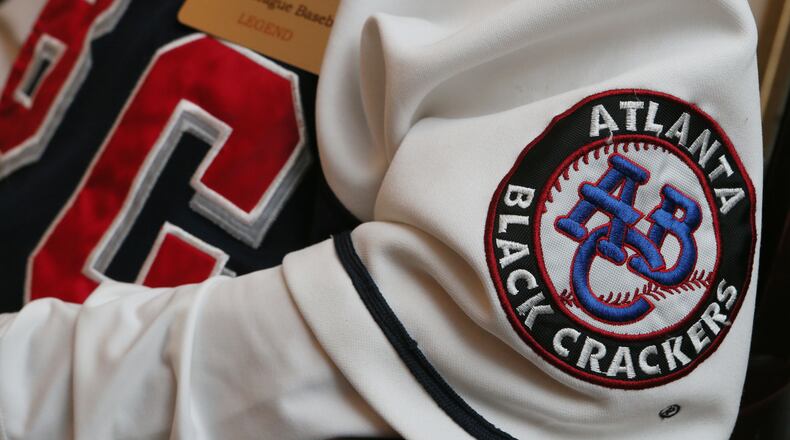The Atlanta Black Crackers are now officially Atlanta’s first major league baseball team.
Major League Baseball has reclassified the Negro Leagues as a major league and will count the statistics and records of its 3,400 players as part of its history.
The league said Wednesday it was “correcting a longtime oversight in the game’s history” by elevating the Negro Leagues on the centennial of its founding. The Negro Leagues consisted of seven leagues, and MLB will include records from those circuits between 1920-48. The Negro Leagues began to dissolve one year after Jackie Robinson became MLB’s first Black player with the Brooklyn Dodgers in 1947.
Those leagues were excluded in 1969 when the Special Committee on Baseball Records identified six official “major leagues” dating to 1876.
“It is MLB’s view that the Committee’s 1969 omission of the Negro Leagues from consideration was clearly an error that demands today’s designation,” the league said in a statement.
The leagues that have been elevated to official major league status are the Negro National League (I) (1920-31); the Eastern Colored League (1923-28); the American Negro League (1929); the East-West League (1932); the Negro Southern League (1932); the Negro National League (II) (1933-48); and the Negro American League (1937-48). Those leagues produced 35 members of the Baseball Hall of Fame, including Oscar Charleston, Cool Papa Bell, Satchel Paige and Josh Gibson.
MLB said it considered input from the National Baseball Hall of Fame and Museum, the Negro League Researchers and Authors Group and studies by other baseball authors and researchers.
The league will work with the Elias Sports Bureau to review Negro Leagues statistics and records and figure out how to incorporate them into MLB’s history.
“All of us who love baseball have long known that the Negro Leagues produced many of our game’s best players, innovations and triumphs against a backdrop of injustice,” Commissioner Rob Manfred said in a statement. “We are now grateful to count the players of the Negro Leagues where they belong: as Major Leaguers within the official historical record.”
The Atlanta Black Crackers played two seasons in the high Negro Leagues, the one now being recognized by Major League Baseball, in 1932 and 1938. The team played out of Ponce de Leon Park.
Originally named the Atlanta Cubs, the team changed its name to the Atlanta Black Crackers in 1919. The name change was made because many fans used the name, which referred to the Atlanta Crackers, a white team. They joined the Negro Southern League in 1920. The Atlanta Black Crackers made one trip to the Negro Leagues playoffs. In 1938, they won the second half of the 1938 split-season of the Negro American League but lost both games to the Memphis Red Sox. The team left Atlanta to become the Indianapolis ABCs in 1939.
Pee Wee Butts, the teenage shortstop for the 1938 Black Crackers, went on to play in eight Negro Leagues All-Star games, mostly with the Baltimore Elite Giants, but the Atlanta native never got a chance with a white major league team. Now, Butts is officially recognized as a major leaguer.
So is Red Moore, the ’38 Crackers’ first baseman and last living member of that team until he died in 2016 at age 99. Moore became an ambassador for Negro Leagues baseball in his later years, honored at Braves games.
Chico Renfroe, a Negro Leagues All-Star with the Kansas City Monarchs in 1946, later became an official scorer with the Braves and was a popular Atlanta sports broadcaster and sports editor of The Atlanta Daily World. He now joins many of the Braves that he covered as major leaguers. Renfroe is now a major leaguers.
The most famous of Georgia’s former negro league players is Gibson, the Buena Vista native who became blackball’s greatest slugger in the 1930s and 1940s with the Pittsburgh Crawfords and Homestead Grays. Gibson, sometimes called the Black Babe Ruth, was inducted into the Baseball Hall of Fame in 1972, though denied the chance to play in the white major leagues.
Other Negro Leagues greats from Georgia, now recognized as major leaguers, include Atlanta’s Dick “Cannonball” Redding, considered one of baseball’s fastest pitchers 1910s and 1920s, and shortstop Dobie Moore of Atlanta and pitcher Phil Cockrell of Augusta, stars of the first Negro Leagues World Series in 1924. Pitcher Bill Byrd of Canton and catcher James “Pig” Greene of Stone Mountain were others who made several Negro Leagues All-Star games in the 1930s and 1940s who can now be called major leaguers.
Major League Baseball came to Atlanta in 1966 when the Braves relocated from Milwaukee.
- Correspondent Todd Holcomb contributed to this article.
About the Author
Keep Reading
The Latest
Featured


